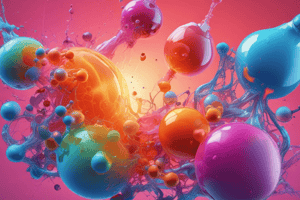Podcast
Questions and Answers
Which factor primarily influences the rate of a chemical reaction according to the principles of physical chemistry?
Which factor primarily influences the rate of a chemical reaction according to the principles of physical chemistry?
- Concentration of reactants (correct)
- Nature of the solvent
- Pressure applied during the reaction
- Temperature of the environment
In the context of chemical equilibrium, what does Le Chatelier's principle state?
In the context of chemical equilibrium, what does Le Chatelier's principle state?
- Catalysts affect the position of equilibrium.
- Pressure changes only affect gas-phase equilibria.
- A system at equilibrium will adjust to counteract changes in concentration, temperature, or pressure. (correct)
- Equilibrium can only shift right with increasing temperature.
Which thermodynamic quantity describes the amount of energy available to do work?
Which thermodynamic quantity describes the amount of energy available to do work?
- Entropy
- Internal energy
- Gibbs free energy (correct)
- Enthalpy
What characterizes a first-order reaction in physical chemistry?
What characterizes a first-order reaction in physical chemistry?
What is the function of a catalyst in a chemical reaction?
What is the function of a catalyst in a chemical reaction?
Flashcards are hidden until you start studying
Study Notes
Reaction Rates
- Activation energy is the primary factor influencing reaction rates. Lower activation energy leads to faster reactions.
- Temperature, concentration of reactants, and presence of catalysts also affect reaction rates.
Le Chatelier's Principle
- This principle states that if a change of condition (e.g., temperature, pressure, concentration) is applied to a system in equilibrium, the system will shift in a direction that relieves the stress.
Gibbs Free Energy
- Gibbs Free Energy (G) describes the amount of energy available in a system to do useful work at constant temperature and pressure. A negative ΔG indicates a spontaneous process.
First-Order Reactions
- In a first-order reaction, the rate is directly proportional to the concentration of only one reactant.
- The reaction rate constant has units of inverse time (e.g., s⁻¹).
- The half-life remains constant regardless of the initial concentration of the reactant.
Catalyst Function
- Catalysts increase the rate of a reaction without being consumed themselves.
- They achieve this by lowering the activation energy of the reaction, providing an alternative reaction pathway.
Studying That Suits You
Use AI to generate personalized quizzes and flashcards to suit your learning preferences.




